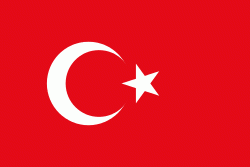Uluborlu (Uluborlu İlçesi)
Uluborlu is a town and district of Isparta Province in the Mediterranean region of Turkey. The population was 6,385 in 2010.
Throughout history, Uluborlu has been on the military and commercial crossroads of Asia minor which has shaped its character.
Settlement is known from prehistoric times and in early historic times was part of Phrygia which fell to Alexander the Great in the 330s BC. Following Alexanders death it passed to the Asian arm of the Seleucid Empire and then the Kingdom of Pergamon (188-133 BC) for 130 years, when it was ceded to the Romans and formed part of the province of Cilicia until the division of the Byzantine Empire in 395 AD, when it was known as Apollonia In 1074 Uluborlu passed into the hands of the Seljuk Turks but in the years 1119-1120 returned to Byzantine control. In 1403 Timur seized the city and the men in the town were killed as retribution for their defence of the city, the women and children were taken captive.
During the Ottoman period of the 15th and 16th centuries Uluborlu prospered and supported the new dynasty. Hamid Sanjak held the first census of Uluborlu in 1831 and in 1911 Uluborlu suffered a great fire, In 1963 the municipality of Uluborlu was established.
Throughout history, Uluborlu has been on the military and commercial crossroads of Asia minor which has shaped its character.
Settlement is known from prehistoric times and in early historic times was part of Phrygia which fell to Alexander the Great in the 330s BC. Following Alexanders death it passed to the Asian arm of the Seleucid Empire and then the Kingdom of Pergamon (188-133 BC) for 130 years, when it was ceded to the Romans and formed part of the province of Cilicia until the division of the Byzantine Empire in 395 AD, when it was known as Apollonia In 1074 Uluborlu passed into the hands of the Seljuk Turks but in the years 1119-1120 returned to Byzantine control. In 1403 Timur seized the city and the men in the town were killed as retribution for their defence of the city, the women and children were taken captive.
During the Ottoman period of the 15th and 16th centuries Uluborlu prospered and supported the new dynasty. Hamid Sanjak held the first census of Uluborlu in 1831 and in 1911 Uluborlu suffered a great fire, In 1963 the municipality of Uluborlu was established.
Map - Uluborlu (Uluborlu İlçesi)
Map
Country - Turkey
 |
|
| Flag of Turkey | |
One of the world's earliest permanently settled regions, present-day Turkey was home to important Neolithic sites like Göbekli Tepe, and was inhabited by ancient civilisations including the Hattians, Hittites, Anatolian peoples, Mycenaean Greeks, Persians and others. Following the conquests of Alexander the Great which started the Hellenistic period, most of the ancient regions in modern Turkey were culturally Hellenised, which continued during the Byzantine era. The Seljuk Turks began migrating in the 11th century, and the Sultanate of Rum ruled Anatolia until the Mongol invasion in 1243, when it disintegrated into small Turkish principalities. Beginning in the late 13th century, the Ottomans united the principalities and conquered the Balkans, and the Turkification of Anatolia increased during the Ottoman period. After Mehmed II conquered Constantinople (Istanbul) in 1453, Ottoman expansion continued under Selim I. During the reign of Suleiman the Magnificent, the Ottoman Empire became a global power. From the late 18th century onwards, the empire's power declined with a gradual loss of territories. Mahmud II started a period of modernisation in the early 19th century. The Young Turk Revolution of 1908 restricted the authority of the Sultan and restored the Ottoman Parliament after a 30-year suspension, ushering the empire into a multi-party period. The 1913 coup d'état put the country under the control of the Three Pashas, who facilitated the Empire's entry into World War I as part of the Central Powers in 1914. During the war, the Ottoman government committed genocides against its Armenian, Greek and Assyrian subjects. After its defeat in the war, the Ottoman Empire was partitioned.
Currency / Language
| ISO | Currency | Symbol | Significant figures |
|---|---|---|---|
| TRY | Turkish lira | ₺ | 2 |
| ISO | Language |
|---|---|
| AV | Avar language |
| AZ | Azerbaijani language |
| KU | Kurdish language |
| TR | Turkish language |















